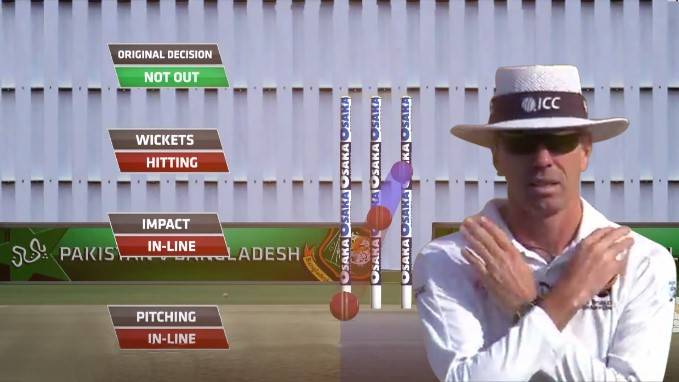Rawalpindi Test a nightmare for Nigel Llong

Stay tuned with 24 News HD Android App

A wrong decision can change the entire complexion of a match and cricket history is full of such decisions where one wrong decision entirely changed the result of a whole five day Test match. Limited overs cricket is also no exception. Local umpires and no use of technology caused many disputes in the past which forced ICC to change the rules accordingly. Thanks to Imran Khan who showed courage to introduce neutral umpires in a home series against West Indies (1986-87). Indian Umpire V.K. Ramaswamy and Piloo Reporter supervised the matches and it was appreciated all over the world. Now all the test matches are supervised by neutral umpires. This has improved the credibility of the game and somehow released the pressure from the umpires.
The ICC has an Elite Panel of umpires to supervise international matches which are categorized according to their experience, skills and accuracy. Above 90 percent accuracy in decisions is compulsory to qualify for the ICC Elite Panel. Then continuity in performance is required to keep the permanent position in the Elite Panel. Former ICC Elite Panel Umpire Asad Rauf, who has supervised 49 Test matches, says ICC has a mechanism to evaluate the performance of the umpires which determines the ranking, contract money and contract duration of the umpires in the Elite Panel.
The first Test between Pakistan and Bangladesh is being discussed among the experts on the quality of umpiring. Match was supervised by Chris Gaffeny of New Zealand, and Nigel Llong of England. Chris Gaffeny was good at decision making but at the same time it became a nightmare of seasoned umpire Nigel Llong. His six decisions were challenged during the match and on all occasions he was proven wrong.
The nightmare started on the first day when in the second over the match Tamim Iqbal was declared not out on an LBW appeal from Muhammad Abbas. Azhar Ali opted for the referral and got the decision in his favor from the third umpire. Second wrong decision of the day came when Bangladesh batsman Liton Das was declared not out against the bowling of Haris Sohail. Timely referral earned Pakistani team another wicket and broke the partnership between Muhammad Mithun and Liton Das, which was becoming dangerous. Nigel Llong further improved the tally of wrong decisions on the very first day of the match by declaring Muhammad Mithun not out against the bowling of Naseem Shah. Rizwan Ahmed had caught him behind the wickets but the Umpire was confused in making any decision. Firstly he talked to leg umpire whether it was taken cleanly, then he decided in favor of the batsman. Azhar Ali once again challenged the decision and got the decision reversed in his favor from the third umpire.
On the second day of the match Nigel Llong couldn’t improve his tally of wrong decisions as Pakistani team lost just three wickets and managed to handle the opponent bowling attack.
On the third day of the match the nightmare started once again when Nigel Llong declared Bangladesh Captain Nazamul Hossain not out. This was a crucial time for both the teams as Bangladesh was moving towards building a valuable partnership. Pakistan opted for the referral and won a decision in its favor. This decision paved the way for a new world record as it was the first dismissal of the hat trick made by Naseem Shah, who is now the youngest in the world to earn this landmark.
The nightmare continued on the fourth day, as well. This time the victim was Robel Hussain who was declared out by Nigel Llong. This was the first time that some Bangladesh batsman had to challenge Llong’s decision and he was fortunate enough to get the decision in his favor. The bad luck continued, Nigel Llong’s decision was once again challenged by Azhar Ali when he declared Abu Javed not out on the bowling of Yasir Shah. Interestingly, all the decisions he made were while Pakistan was bowling. Five out of six challenged decisions were against Pakistan and in only one case Bangladesh avoided a dismissal.
Former Elite Panel Umpire Asad Rauf showed deep concern over the quality of umpiring in Pakistan Bangladesh Test match. “Technology has saved cricket from many controversies and it is actually supportive for umpires, but at the same time poor performance of some umpire can change his ranking and reduce his contract money”, Asad Rauf added.
Nigel Llong was, mostly, reluctant in declaring the batsman out. In five out of six challenged decisions Llong did not declare the batsman out. After being referred, Nigel Llong had to reverse his decisions in favour of the bowlers. Asad Rauf says “One bad decision shakes the confidence of an umpire, which could lead him to making some more bad decisions”.
